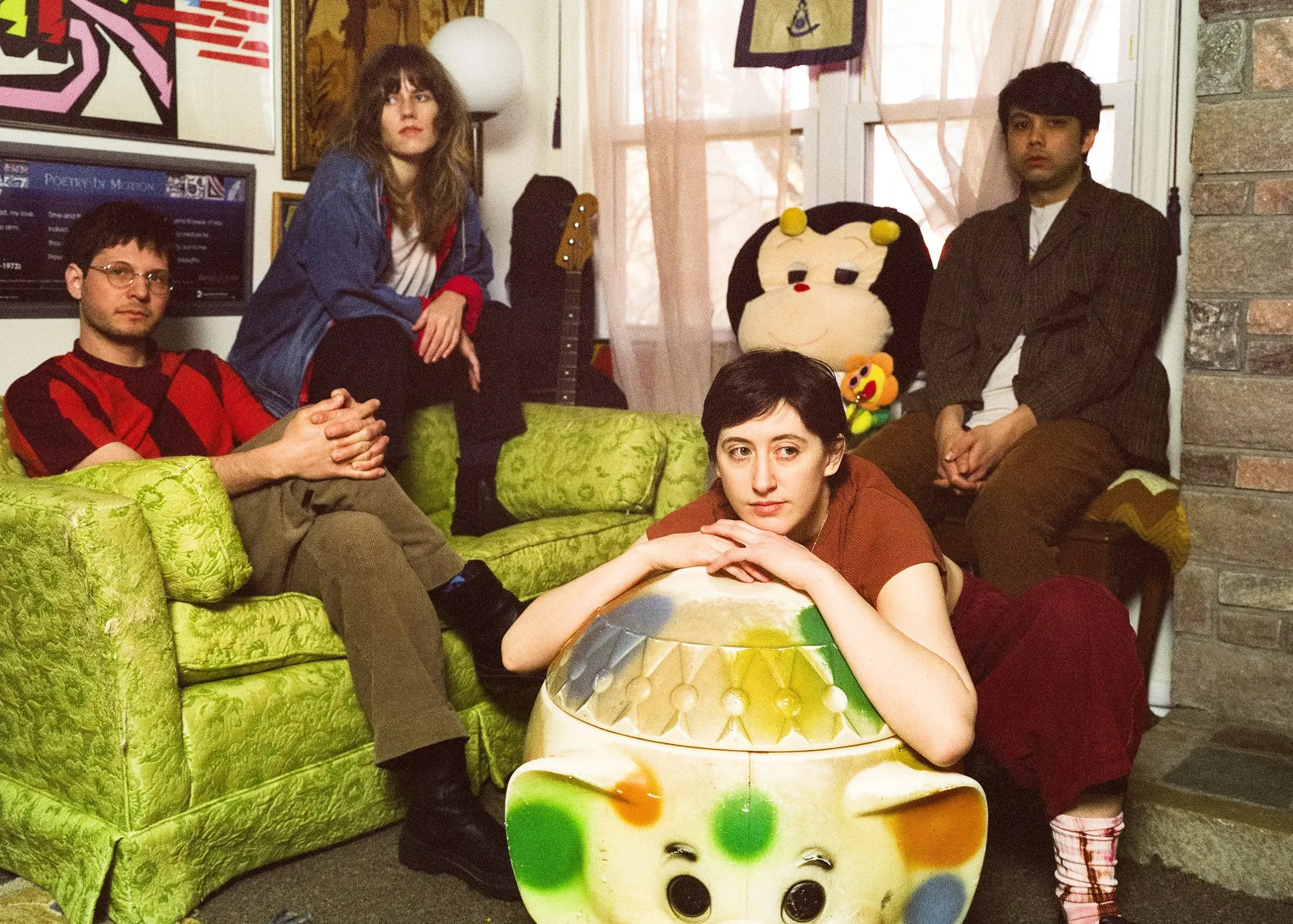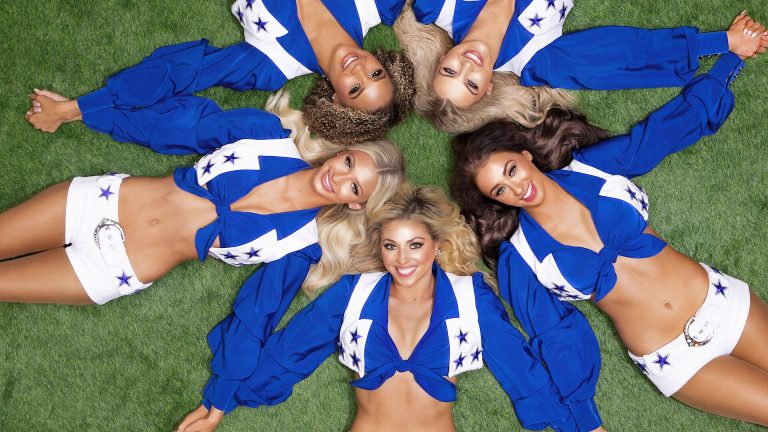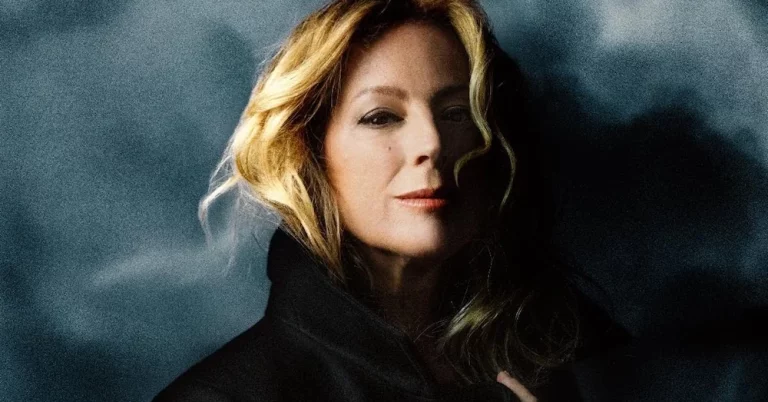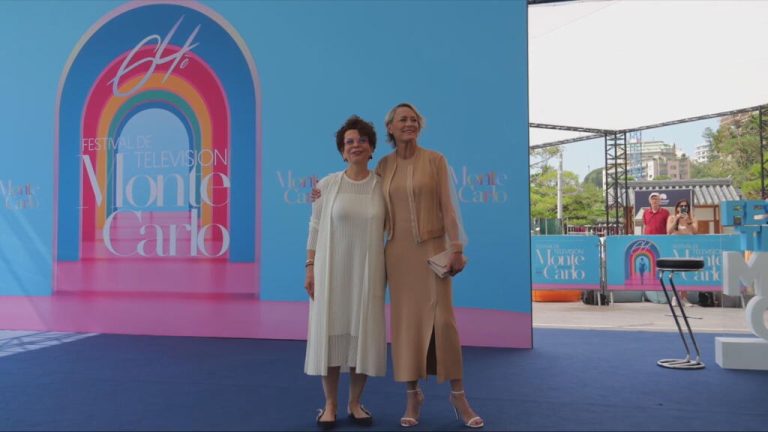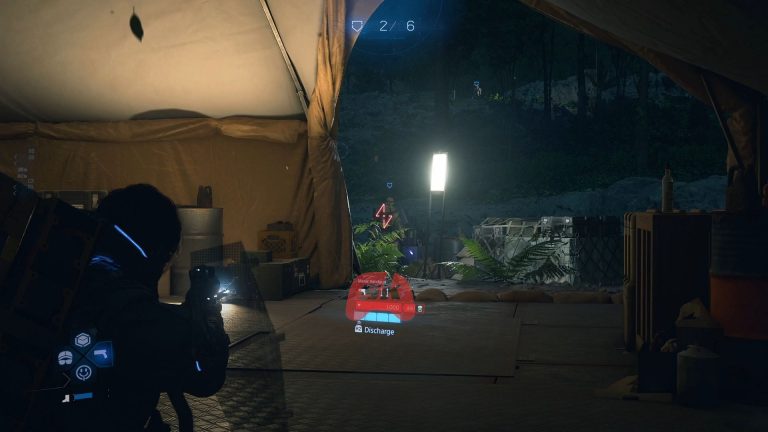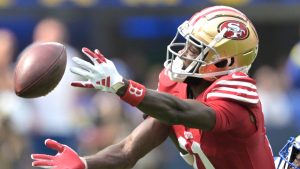For a while, the names Frankie Cosmos and Greta Kline could almost be used interchangeably. Deriving her moniker from the poet Frank O’Hara, the musician hoped the distinction would serve as a shield of privacy despite the intimate nature of her songwriting, and at least until her label debut, 2014’s Zentropy, it probably helped. Now, Frankie Cosmos is a four-piece that includes Alex Bailey (guitarist and member of the band since 2017), Katie Von Schleicher (who co-produced 2022’s Inner World Peace and is a singer-songwriter in her own right), and drummer Hugo Stanley. Their new album, Different Talking, is the first that they recorded as a unit with no outside studio producers, tracking it at a house in upstate New York that they all lived in for a month and a half. Which, in a funny little way, means that it is the first self-produced Frankie Cosmos since Kline first started posting sparse folk-pop songs on Bandcamp. More than reevaluating the meaning of home-recording at a different point in life, of course, Different Talking considers and embodies home, grief, and all those microcosmic, universe-expanding feelings the heart seems to produce in circles as the world flashes by. “We can all agree/ That time is both frozen and moving faster than we can see,” goes a song titled ‘One! Grey! Hair!’. We can all agree, and Frankie Cosmos can play to its rhythm.
We caught up with Frankie Cosmos to talk about kitchen table crafts, recording in a house, going to town, and other inspirations behind Different Talking.
Kitchen table crafts
Greta Kline: I wanted to make a category that kind of encompasses two things: Katie and I were doing watercolors throughout, and Hugo and I were doing spirograph. All of us were doodling and stuff, and we had notepads around. I ended up using scraps of everybody’s different visual art throughout the album in the insert. The kitchen was where we would do other visual stuff, and it was a nice mental break.
Hugo Stanley: I don’t know how intentional this was, but I feel like Greta almost curated or cultivated the vibe of the creative activities in the kitchen, and it’s cool that it ended up informing the art for the album. It felt like a way to take a break from working on the record. But in retrospect, it was actually also productive in some way. Unless that was your plan all along.
GK: No, it wasn’t.
Alex Bailey: What I remember is every night, Katie would go to bed at a reasonable time, and then Greta and Hugo and me – I would be there too, but I didn’t spirograph as intensely as Greta and Hugo. They would sit there and think that they were unlocking, like, theoretical shapes with the spirograph. [laughter] They would be on theoretical shapes Wikipedia talking about, like, Mobius script.
Katie Von Schleicher: I’d wake up at, like, eight or something and do my morning stuff, and Greta would come down and before even having coffee would be like, “Here’s a Mobius script that I created. Do you actually know how the Mobius script works?” And I’d be like, “What happened at 2am?”
AB: There’s a good video of you guys talking about the Mobius script.
GK: It’s a nonorientable surface… [laughter] It’s kinda like we were at this little summer camp – there’s the music room, and then there’s the art room, and the cafeteria becomes the art room after hours. Katie and I did crafts during the day, we did watercolors in the afternoon, have a coffee or matcha and paint on this little paper that we got in town.
KVS: I spent more time probably in the control room just doing, whatever, crossfades in Pro Tools.
HS: I feel like Katie, by virtue of being the engineer, was just on a completely different schedule than the rest of us in a way, even though we were together a lot of the time. An engineer’s work fully encompasses the band work, and then some. So there were a lot of times where we’d be getting takes, and the three of us maybe would walk away and Katie would continue to work hard.
GK: If Katie had a break, it meant we all had a break.
KVS: I think my schedule is just because I’m an introvert, and I wanted some time alone to sit and stare at the wall at night.
Going to town
I’m assuming you mean this literally, not figuratively.
AB: [laughs] Yeah, I didn’t consider, like, going to town.
GK: I meant it literally. We were ten minutes from town, and we didn’t have very close neighbors. It was a pretty isolated house, so we could have gone the whole summer without seeing a single other human, and we elected to go on trips to the grocery store and to the farmer’s market and to get treats, and that became a really nice break activity.
KVS: All of us are used to living in a city, right? So I would just jog around this circle around the field where we were, or jog on this hiking trail up the hill. But otherwise, I would be like, “Can we please just drive fifteen minutes to town and walk around and stare at antiques for an hour?”
I feel like the tension between staying inside and going out – wanting to be part of the world or simply observing it – is embedded on the album. I’m thinking of the first lines on the final track, ‘Pothole’, even though it’s looking back on living in the city.
GK: I’m realizing that that last track, it feels a little like The Truman Show. It’s like everything revolves around me, whether it’s negative or positive – the first half is kinda negative and the second half is finding the beauty in the world – and I think that relates to the concept of going to town because it’s about these little characters in your that might be microscopic on the scale of the universe, but they’re a huge part of your experience of a time in your life. For us, there were these specific things that became regular parts of our schedule. We became friendly with the woman who sold mozzarella at the farmer’s market and the local paper that we would pick up at the grocery store. We would read about the town’s comings and goings. And even though we were kinda weird outsiders, we got to have this connection to these little random things.
KVS: I think the paper was also this marker of time because we were outside of the city, in this very constant sort of visual space – even when you go outside, nature is also this constant. It’s just very different from a city. It was a weekly paper, so it would be like, “Is there a new one?” And we’d be like, “Oh, no.” Because we kind of had no sense of time outside of if the new paper drops. It would be spread across the kitchen table, and we’d be collectively doing the crossword. It became part of the crafts. I also think that the reason it feels so album- y to me is that we spent so long, but there are not, like, a million little sounds across the album. We had this set of watercolors that we used to make all of the songs coalesce, and I think it is informed by where we were. Like you said, on ‘Pothole’, reflecting back on the city, it still feels like it was painted with the brush of where we were when we did it.
GK: That’s really cool, Katie. I hadn’t thought about it like that, but all the tools were in the house, and that was our limitation. And then sometimes you go to town and you have to get another tool.
Mouse tally
@frankiecombos Mice cannot get into the fridge so
AB: While we were practicing ‘Against the Grain’ was when we saw the first mouse appear.
GK: He came into the room where we were playing loud music, and he kinda ran around and then ran out. Like, he liked ‘Against the Grain’.
AB: It was a vibey song for him. We humanely caught, what was it, 27 mice or something and released them.
HS: Assuming there weren’t any repeats.
AB: Absolutely, Hugo, that’s a good point. It felt like we were sort of providing dinner and an Uber service to the mice. [laughter] It was like, “Come to this restaurant inside of a tube, and I’m gonna meet you back outside.”
GK: We gave them delicious cheese and delicious halva and all kinds of great stuff.
Was that from the mozzarella lady?
GK: Sometimes. We mostly ate the mozzarella from the mozzarella lady.
AB: For a while, we were doing this multiple times a day.
GK: Every night, we would set the traps, and every morning, we would empty them, and they would have little cute mice in them. Everyone emptied them except for me – I didn’t want to empty them.
KVS: Well, if we have to make it metaphorical, it’s kind of a metaphor for all of our different experiences within the world to the same stimuli, because we all had very different feelings about the mice.
HS: Our interactions with the mice and the mouse traps would be at different times sometimes based on our sleep schedule. The first person up would sometimes be the person that liberates the mice. Sometimes I’d be lying in bed but still awake, and I’d hear the trap go and take one out, because otherwise they’re in there for hours and hours.
Was the tally correlated with your productivity in any way?
GK: Personally, my goal was to record at about the same rate that we were collecting mice. When we had released three, I wanted to have three songs recorded. There was a point where it was feeling in tandem, and I wanted to keep up with the rate. I don’t know if I expressed that to you guys. And we kept a tally also, for the information – it was really to relay to the owners of the house, this is where the mice are mostly getting caught, what time and stuff like that, so that they could figure it out. But I had a really detailed tally every day, like, “Katie released one that was found in the office room, caught with halva.” I had a list of what songs we practiced that night, what songs we recorded that day, what movie we watched, and how many mice had been caught, sort of graphing them altogether.
KVS: Not surprising given your songs, Greta, but, obviously, Greta records every detail of everything. It’s really impressive. I usually forget and have no idea, and she’ll be like, “Here’s my list of the exact facts of what happened throughout time.”
Sometimes it’s “The facts: I felt betrayed” [a line from ‘One! Grey! Hair!’], and sometimes the facts are a list of every mouse and how it was caught.
GK: Exactly.
AB: I was taking them out three at a time by myself.
KVS: I took one out almost every morning. One time, it was two.
GK: If I didn’t see Alex take them out or if Alex didn’t see the mice before Katie, my fear was that Katie was just gonna set them back loose in the house. Because Katie liked them a little too much. Katie wanted to live amongst the mice.
AB: She would grab a handful of fucking rice on the way out and be like, “This is for the mouse.”
KVS: I have a pet bird, and I would feed her rice, so I had this cooked brown rice. And yeah, I got to a point where I started feeling so guilty because even though we’re living in the country, we’re still in this very separated world from the mice and how they live, and they don’t live outside. They’ve never lived outside. Even across a field yeah, they’re just gonna… So I would leave a little rice for them to be oriented by.
Wah pedal
There’s a range of guitar textures and tones that are weaved throughout the album, and I’m curious why you picked the wah pedal.
AB: Whenever you hear the really biting, trebly guitar, like on ‘Not Long’ or the end of ‘Pothole’, that’s the wah pedal.
KVS: A wah pedal is just a filter, so Alex used the wah pedal completely pushed all the way up, which actually presses it to a zone that’s brighter than is possible without the wah pedal on. Every synthesizer on the record became these pulses of a filter opening and closing, which to me, in ‘Pothole’, is like the sun peeking over the city’s skyline in the second half. I feel like maybe that’s a response to where Alex was at because Alex came into the sessions with this new set of tools, like the attenuator on the amp and the wah pedal. I did synths later, maybe responding to your sonic palette a little bit with the filter.
AB: This could have gone into the “going to the town” category too, because we bought the wah pedal at a guitar shop very close by. It’s also tied into this whole Cindy Lee style of guitar – I’m a huge fan of Pat Flegel and Women in general – and if you cross check it, it does sound a lot like that.
GK: Yeah, I think we all like that Cindy Lee record.
KVS: Because we weren’t in a studio, perhaps, but sonically, the thing I’m so proud about with this album is that we had this palette and we stuck to it for every song. To give Hugo a lot of credit as a drummer, he’s super textural and creative, so with the drums, he sets different toms throughout different songs. We had our jobs to do that, but we kept using our same set of tools.
AB: On something like Inner World Peace, we were changing the guitar sound, and I was wanting to basically fix it because we were getting something wrong every time. But I think with this one, even from the arrangement part, I had it figured out, and I didn’t feel like I needed to change anything basically the whole time.
HS: Because we arranged and recorded in the same place, I feel like that’s conducive to being more economical with arrangements. More often, my experience has been that you work on songs for a year or two, and then you go into the studio and suddenly you’re in this new environment and you have to reimagine what it should sound like in a way. There’s this sense of like, “It sounds like this in the practice space, but it’s not gonna sound like this when we make the record.” Whereas in this situation, we were in the space we were gonna record, and we were using the tools that we were gonna use. We could rely less on this hypothetical future sound, and there was a sort of practicality to the arranging.
Cooperative games
I’m guessing this also fits in with the crafts.
GK: The way that it fits in is that we were playing Boggle, which, sometimes you doodle on the sheet where you’re writing words, and there was a Boggle sheet that ended up part of the album art. But mostly, we were playing a lot of this game called Codenames and another game called Redactle. With Redactle, you go on a website and it shows you a random Wikipedia page, but it’s completely redacted except the articles, so you have to guess words until you unlock what the page is about. And it’s either impossible or really, really fun. We would all be on the same Redactle page, working together, typing in a bazillion guesses, all of us sitting on our own computers at the kitchen table.
KVS: That was a nice, silent thing. The screen of Redactle is black with white text – it looks like we’re coding or something. It’s strange.
GK: I actually have a really good way to connect Codenames to making the record too. It’s a board game that comes in a set, and you have these cards that have words on them, and you’re working in teams to get someone to guess which words are part of your group of words that you’ve been assigned. We also invented a bunch of new ways to play it also, and I think that gameplay and creating a puzzle for yourself fits into the thing of having a palette and using it in different ways. We had this board game, but we weren’t just playing it the way it was intended. We were also making up new versions of it because we got bored of the original version or just wanted to try something new.
KVS: To do some Greta credit for a second, we made this album in, I think, the most romantic possible way. We were isolated in a house together for weeks at a time. We used a tape machine. We used these old Tascam preamps. We constantly interacted with one another playing games when we weren’t working. All of this is possibly how a band hates each other and stops talking to each other. [laughs] I think it speaks to Greta being the person who brings these four people together and the person who absolutely creates all of these things happening at all. I could have easily just been on my computer, doing whatever in another room. But Greta is endlessly curious and ready to play, to solve a new puzzle. I feel like you hold all of that together.
GK: That’s nice. We set up to record this album having only toured for ten days together total as a four piece. We’d been playing together and practicing, but we hadn’t toured that much together when we set out to make the record, so I feel like I was being a camp counselor trying to get us to bond. In tandem with making a record, we were also building our rapport as a band and our communication and our dynamics together, figuring that out just day by day. And it’s not like everyone was getting along so great every single day.
AB: Especially, in regards to games, yeah, I would get really upset. [laughter]
GK: And recording an album, there’s always gonna be disagreements. It’s hard to get four people to all be like, “That was the take. Let’s move on.” The reason that a basketball team has a coach – Alex was explaining to me because I’ve been getting into basketball – is so that the teammates don’t have to communicate with each other in the harsh critical way that an outsider might be able to. That’s what a producer does a lot of the time, and we were all thrust into that position. It was a really good team building summer.
KVS: I guess that’s why I think it’s romantic overall.
Louis Theroux’s Weird Weekends
GK: We started out watching movies when we started recording, and then we just descended into watching Weird Weekends every night. We just really all liked it, and it was entertaining. I think watching stuff together is also part of the same thing – the quotes that you all laugh at, that you then say to each other the next day, the slang that you pick up; if you’re watching the same thing as each other, you’re gonna be more on the same page. You’re eating the same foods and you’re playing the same games and you’re watching Weird Weekends at night, and then you’re making jokes about that episode of Weird Weekends while you record whatever guitar part.
Recording in a house
What conversations did you have going into the process, having had the experience of recording in a studio? Were there things you were wary of?
KVS: I can say at the outset, I was very worried as the person who was providing all of the recording equipment. I had never tracked a band to this tape machine. There were a lot of really practical concerns from me. I felt really afraid from an engineering perspective, because I always do feel that way before something I feel very excited about, honestly. Just this trepidation of, like, Hugo can play the best thing ever, but if I record it poorly – that responsibility initially felt like it was mine.
AB: The way that we recorded this to the tape affected it a lot, because you want to try to keep everything that you’re recording to tape that one time. I played acoustic guitar on a lot of it, and I played the easiest thing possible to make sure that whatever I played made it onto the tape and we didn’t have to erase and redo. And that’s very different from the idea that you’re recording digitally, and you can try something literally a million times if you want to and redo it. A lot of things I played, I played from start to finish, which is really rare for me personally.
HS: It’s funny because on the one hand, the tape creates this limitation to get complete takes, but on the other hand, what comes with recording in a house versus a studio is that you’re not watching money fly out the window as the clock ticks. So in a take-by-take, more microcosmic sense, it feels temporally limited. When you’re recording digitally, there’s this open-endedness and lack of limitation. So the tape provided this limitation, but I think that was a wanted or even needed limitation, in the context of the lack of limitations that comes with recording in a house.
KVS: All of those actual technical constructs were as much or even more so psychological ones. The tape was, for certain of us, such a psychological thing. First of all, it is like looking in a mirror that you know will be nice to you. It does this nice thing with the frequencies of an instrument – with a little bit of compression, so, okay, that’s the technical reality of the tape. But then the psychological reality of the tape is really helpful. Most people record to a click in this very modular way now, and this was not because all of the tempos inside Greta’s songs are constantly fluctuating in response to the song and what it needs. There was zero, like, “We are beholden to a tempo.” We’re actually beholden to nothing except for the take that we create.
GK: I’m just warped against the grain. [laughter] I’m just really happy with how the record sounds, and it does feel somehow reflective of recording in the house. It feels like a cozy record to me, maybe because I was there, but I also think the sounds are warm. You can feel that–
AB: The amp was in the bathroom.
GK: Yeah, and we were recording drums in the same room that we were watching TV at night. We would take the blanket off the TV and then put the blanket back on for sound during the day. I just feel like you can feel that.
Katie, you mentioned the phrase “psychological reality,” and I wanted to take another line out of context: that question of “Is it really home?’ from ‘Tomorrow’. Did you feel like this physical space was becoming an emotional space that wasdefined along the lines of the group, too?
GK: It’s complicated because it’s a house that Alex and I have lived in for a longer period of time separate from this. I’d be curious to see if Katie and Hugo ever felt at home there the way that I did. But I think I’m always asking questions about home, as a state of mind more than a physical place. I think this record lyrically does ask a lot of questions about physical spaces and who you are in them, and if you change and then you go back to the same place, how does it feel different?
KVS: How much of the writing of the songs, Greta – because you lived in the house during lockdown – do you think could be potentially informed by your own experience in the space way prior?
GK: It’s hard to say. It’s been a formative five, six years, with or without COVID. I’ve lived in New York my whole life, I’ve never really lived anywhere else. We lived in this place upstate sporadically, but it’s still very close to the city, and I still consider it living in New York. I think being a musician and choosing this life and building a family with a band and making an album, which is like making a home for yourselves – the line on ‘Pothole’ that I really wanted to end the record with is, “Here’s what we have made.” And it’s the album: that’s our home that we built around ourselves, piece by piece. That’s something that I’ve been thinking about as I get older and decide whether I wanna keep touring and keep – it’s a life you keep choosing, being a musician, and I keep choosing it. It’s part of me, and it’s also outside of me, and it’s something we’re all doing together. I think all those questions probably would have come up regardless of where I was in the world. Some of them were written on tour, some of them were written when I lived in Brooklyn. Some of them were upstate. Some of them are Upper East Side. One of them was written in 2015; that’s the only one that’s not new at all.
The song ‘Tomorrow’?
GK: Yeah, it’s an old song. And I actually have a photo booth video from 2015 of me writing that song and playing it on an acoustic guitar in the very room that we recorded this album in. Life keeps going on, and you keep finding yourself in the same places being a different person in the same place. And to me, the song ‘Tomorrow’ is about being like, “Am I really doing this? Are you gonna do it with me? And why not?” About making music and being like, “Is this really what my life is gonna look like, and who am I building it with?” It’s really special to play it, especially with someone like Alex, who’s now been in the band for six years, and has been pushing to put that song on a record for the last couple records. So then we did it, and it’s so beautiful to bring it to life with these people that I’ve chosen to make my family right now.
KVS: Coming in as an outsider and choosing this life – I’m a little bit older, and I became an engineer, and I have been in other music things. But feeling that sense of home in this particular band has been really powerful for me. You have to all be in the right place in your life, obviously, to say, “Yeah, I’ve got eight weeks to live in a house with you.”
AB: When we had the tape machine, but we weren’t gonna record yet – we still had days ahead of us where we were not gonna record – I remember being outside with Hugo at night and being like, “Damn, I really wanna go and press record right now.” [laughter] Being really excited it’s all gonna happen, like, “I can do this. We can do this, and we’re gonna do it all here.”
GK: We obviously couldn’t and wouldn’t have done this process if Katie hadn’t joined the band – that was a huge step towards this dream coming true of being able to self-record in this way. But it’s hard to talk about because I don’t want to undermine Katie as a musician in the band – the reason she’s in the band. I wasn’t producing and engineering this, but we were all contributing, and it felt empowering the same way that it felt when I first was making music and first recording myself and figuring out that I could double my voice on GarageBand or whatever. It felt like having a band for the first time in a way that I hope all of us felt, this sense of youthful exploration and excitement.
KS: Totally. Also, I am the only person who engineers for a living, but everybody knows how to engineer in this band. And the reason I did this is solely from a romantic point of view: I just want to seize the means of production for myself so that no matter what’s happening in your life, whether you get a label budget or no one in the world wants to hear your music, you can still make it – you’re still empowered to do so. I hope that maybe everyone left with the feeling of that same empowerment that there’s no great mystery to recording something well. There is this veil of mystery around it, being an engineer, but it’s a very multifaceted thing that I think most people can actually do for themselves.
GK: I’m realizing that part of why ‘Tomorrow’ fits in with this record is because I think lyrically, a lot of this record, I’m singing to my younger self, raging and grieving stuff for her. I think that’s why her song fits into my record because, yes, she’s me, but I also think I’m kind of reaching through time and singing a lot to a past version of myself.
This interview has been edited and condensed for clarity and length.
Frankie Cosmos’ Different Talking is out June 27 via Sub Pop.
